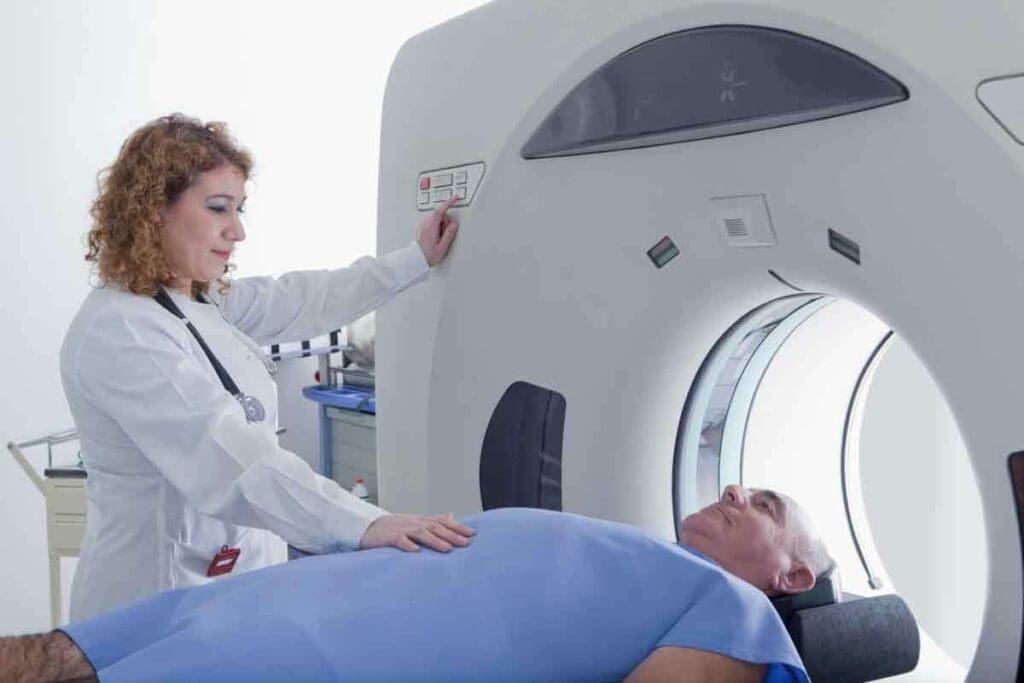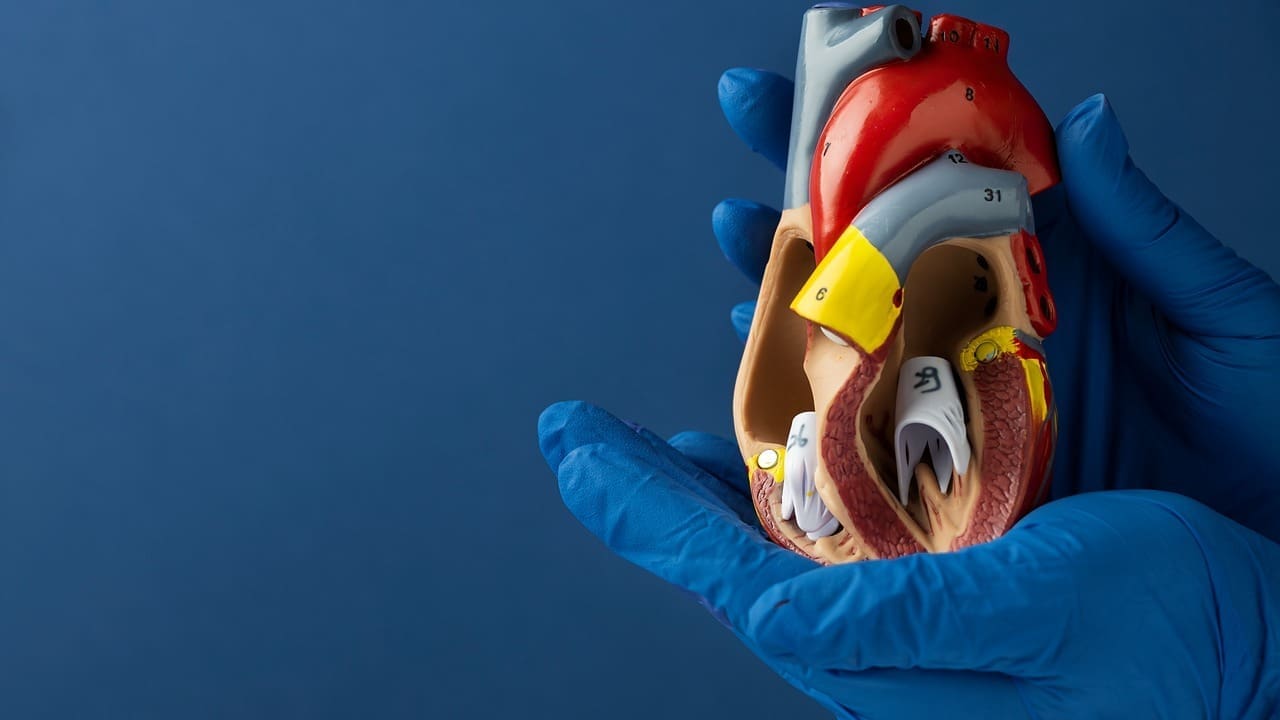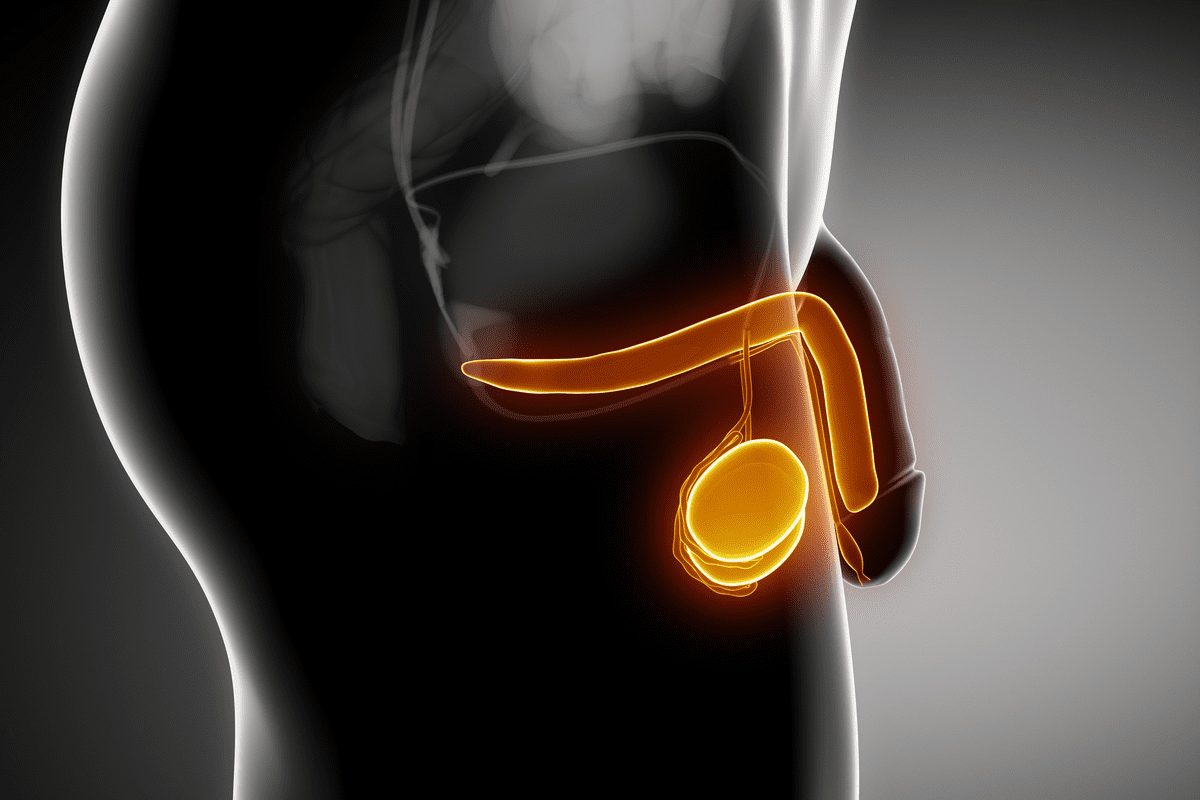Last Updated on November 27, 2025 by Bilal Hasdemir

Getting a correct diagnosis is key to treating colon cancer well. At Liv Hospital, we use top-notch tools to find this disease. PET scans are particularly useful, as they can show colon cancer by detecting areas of increased metabolic activity. Combined with CT scans and blood tests, our approach provides a comprehensive understanding of your health. So, to answer “would a pet scan show colon cancer,” yes, PET scans are effective in detecting colon cancer, especially in staging and identifying metastasis.
PET scans are great at spotting tumors that are active. They work well with CT scans and blood tests. This way, doctors can see how far the disease has spread and plan the best treatment.
Key Takeaways
- PET scans, CT scans, and blood tests are key for finding colon cancer.
- PET scans are very good at finding tumors that are active.
- Using these tools together gives a full picture of the disease.
- Getting the diagnosis right is vital for treating colon cancer well.
- Liv Hospital focuses on the patient in cancer diagnosis.
The Fundamentals of Colorectal Cancer Detection

We start by looking at colorectal cancer basics and how to find it. This cancer type affects many people around the world. Finding it early is key to treating it well.
What is Colorectal Cancer?
Colorectal cancer starts in the colon or rectum. It happens when cells grow out of control. It often starts as a polyp, which might turn cancerous later. We don’t know all the causes, but age, family history, and lifestyle play a part.
Why Early and Accurate Detection Matters
Finding colorectal cancer early makes treatment more likely to work. Early detection lowers the risk of serious problems and boosts survival chances. Knowing the cancer’s stage is also important for choosing the right treatment.
Screening tests are key in finding cancer early. They spot polyps and cancer before symptoms show. People over 45 should get screened, or sooner if they have a family history or other risk factors.
Overview of Diagnostic Approaches
There are several ways to find colorectal cancer, including:
- Colonoscopy: A procedure that lets doctors see the colon and rectum directly.
- Imaging tests: Like CT scans and PET scans, which help find how far the cancer has spread.
- Blood tests: Including tests for tumor markers like CEA.
| Diagnostic Approach | Description | Advantages |
| Colonoscopy | Direct visualization of colon and rectum | High accuracy, allows for biopsy |
| CT Scan | Imaging test for staging and detecting metastases | Detailed images, helps in assessing spread |
| Blood Tests | Tests for tumor markers like CEA | Non-invasive, monitors treatment response |
Using these methods together gives a full picture of colorectal cancer. This helps doctors plan the best treatment.
Would a PET Scan Show Colon Cancer? Capabilities and Limitations
PET scans are great for finding colon cancer because they show tumors that are very active. This is key because cancer cells use more energy than normal cells.
How PET Scans Detect Metabolically Active Tumors
PET scans use a special sugar that cancer cells love. This sugar, called Fluorodeoxyglucose (FDG), helps highlight cancer on the scan. So, PET scans can spot tumors in colon cancer.
Sensitivity and Specificity Rates for Colorectal Cancer
PET scans are very good at finding colorectal cancer. They work best on big, active tumors. But, they might miss smaller or less active ones.
They are also very good at telling cancer from non-cancer. But, sometimes they can say a tumor is cancer when it’s not. This can happen if the body is inflamed or has other issues.
Detecting Metastases in Liver, Lungs, and Lymph Nodes
PET scans are key in finding cancer that has spread. They help spot cancer in the liver, lungs, and lymph nodes. This is important for figuring out how far the cancer has spread and planning treatment.
| Organ | Sensitivity of PET Scan | Specificity of PET Scan |
| Liver | 85-90% | 90-95% |
| Lungs | 80-85% | 85-90% |
| Lymph Nodes | 75-80% | 80-85% |
In summary, PET scans are very helpful in finding and managing colon cancer. They are good at spotting tumors and cancer spread. Knowing how they work is important for doctors to use them well.
CT Scans for Colorectal Cancer: Visualization and Detection
CT scans are key in finding colon cancer. They help see abnormalities and check how far the disease has spread. This is a big step in diagnosing and understanding colorectal cancer.
How CT Technology Visualizes Colon Abnormalities
CT technology uses X-rays to make detailed images of the body, including the colon. Doctors can see tumors’ size, shape, and where they are. These clear images help doctors understand how far colon cancer has spread.
CT colonography, or virtual colonoscopy, is a special CT method for the colon. It uses CT scans to show the colon’s inside. This helps find polyps, tumors, and other issues. It’s good for people who can’t have regular colonoscopy.
Can Colon Cancer Be Seen on a CT Scan?
Yes, colon cancer can be seen on a CT scan. How well it shows depends on the tumor’s size and location, and the scan’s quality. Big tumors are easier to spot, but small ones can be harder.
CT scans are great for finding advanced colon cancer and seeing how far it has spread. They also check nearby lymph nodes or distant organs. But for small polyps or early cancer, colonoscopy might be better.
Detecting Primary Tumors vs. Metastatic Spread
CT scans are good at finding both main colon tumors and where cancer has spread. They show how big and where the tumor is in the colon wall. This helps in planning treatment.
For cancer spread, CT scans are great at finding it in the liver, lungs, and lymph nodes. They help doctors know how far the cancer has gone. Being able to find both main tumors and spread makes CT scans very useful in cancer care.
Blood Tests in Colorectal Cancer: What They Can and Cannot Reveal
Blood tests have a big role in finding and managing colorectal cancer. They can’t diagnose cancer alone but give clues about its presence. They also help track how well treatment is working and if cancer might come back.
Complete Blood Count (CBC) and Colon Cancer Indicators
A Complete Blood Count (CBC) checks different parts of the blood. It looks at red and white blood cells, hemoglobin, and hematocrit levels. In colorectal cancer, a CBC might show signs of cancer, like anemia from blood loss.
Anemia is common in colorectal cancer, more so if the tumor is in the right colon.
A study showed that many with colorectal cancer have iron deficiency anemia. This makes the CBC a key test at the start.
Carcinoembryonic Antigen (CEA) and Other Tumor Markers
Carcinoembryonic Antigen (CEA) is a protein found in some cancers, including colorectal. While not specific to colon cancer, high CEA levels can mean cancer is present or coming back. CEA is great for checking how well treatment is working and spotting recurrence.
“The use of CEA as a tumor marker has become an essential component in the management of colorectal cancer, providing valuable information on disease recurrence and treatment efficacy.”
NCCN Guidelines
Other tumor markers are being studied for colorectal cancer. But CEA is the most known and used marker.
| Tumor Marker | Role in Colorectal Cancer | Clinical Utility |
| CEA | Indicates presence or recurrence | Monitoring treatment response, detecting recurrence |
| CBC | Reveals abnormalities like anemia | Initial assessment, monitoring for complications |
Can Colon Cancer Be Detected with a Blood Test?
Blood tests, like CBC and CEA, are very helpful but not enough to diagnose colon cancer. Diagnosis usually needs imaging, endoscopy, and biopsy. But, these tests are key in managing colorectal cancer.
In summary, blood tests are vital in managing colorectal cancer. They help find cancer, see how treatment is going, and watch for cancer coming back. Knowing what they can and can’t do is important for good care.
Rectal Cancer Diagnostics: Specialized Approaches
Rectal cancer needs a special way to be found. We’ll look at how blood tests and advanced imaging help in finding rectal cancer.
Blood Tests in Rectal Cancer Diagnosis
Blood tests are key in finding and managing rectal cancer. The Carcinoembryonic Antigen (CEA) test is a major one.
CEA Test Significance: The CEA test checks for CEA in the blood. High levels might mean cancer is present. It helps track how well treatment is working and if cancer comes back.
“The CEA test is a valuable tool in the management of rectal cancer, providing insights into the disease’s progression and response to treatment.”Imaging Techniques for Rectal Tumors
Imaging is vital for finding and understanding rectal cancer. We use different methods to see the tumor and how big it is.
- MRI: MRI is great for seeing how far the cancer has spread, giving clear images of the tumor and nearby tissues.
- CT Scans: CT scans help find out how big the cancer is and if it has spread to other parts of the body.
- Endoscopic Ultrasound (EUS): EUS is good for checking how deep the cancer is in the rectal wall and nearby areas.
Differentiating Rectal from Colon Cancer
Telling rectal cancer from colon cancer is important for the right treatment. Both are types of colorectal cancer but need different approaches.
| Diagnostic Factor | Rectal Cancer | Colon Cancer |
| Location | Rectum | Colon |
| Diagnostic Approach | Emphasis on MRI and EUS for local staging | More reliance on CT scans and colonoscopy |
| Treatment Considerations | Neoadjuvant therapy often considered due to location | Treatment varies based on tumor location within the colon |
Knowing these differences helps create a treatment plan that fits the patient’s needs.
Comparing Diagnostic Methods: PET vs. CT for Colorectal Cancer
PET and CT scans are key in finding colorectal cancer. CT scans show the body’s structure, while PET scans look at how cells work. Knowing what each can do helps doctors plan the best treatment.
When PET Outperforms CT in Cancer Staging
PET scans are better at finding cancer spread. They spot cancer in distant places like the liver and lungs. This is because they show active cancer cells.
PET Scan Advantages in Cancer Staging:
- Detection of metabolically active tumors
- Identification of distant metastases
- Assessment of treatment response
CT Advantages in Structural Visualization
CT scans are great for seeing the colon and nearby tissues. They help doctors understand the main tumor’s size and where it is.
CT Scan Benefits:
- Detailed anatomical imaging
- Assessment of tumor size and extent
- Guidance for surgical and radiation planning
Integrated PET-CT Approaches for Comprehensive Detection
PET-CT combines PET and CT scans. This gives doctors both metabolic and anatomical details. It makes cancer staging and treatment planning more accurate.
| Diagnostic Method | Strengths | Limitations |
| PET Scan | Metabolic activity assessment, detection of distant metastases | May miss smaller or less active tumors |
| CT Scan | Detailed anatomical imaging, assessment of tumor size and extent | Limited information on metabolic activity |
| PET-CT | Combines metabolic and anatomical information, enhances staging accuracy | Higher cost, increased radiation exposure |
Understanding PET and CT scans helps doctors choose the best test for each patient. This leads to better treatment plans.
Colorectal Cancer Labs: Specialized Testing and Analysis
Colorectal cancer labs are key in helping doctors care for patients. They use advanced biomarker analysis and genetic testing. These labs help in staging, monitoring, and finding markers, not just diagnosing. They play a big role in managing colorectal cancer well.
What Happens in Specialized Colorectal Cancer Laboratories
These labs do many advanced tests. They include:
- Biomarker analysis to find specific proteins or genes linked to colorectal cancer
- Genetic testing to find inherited mutations that raise cancer risk
- Molecular diagnostics to study the genetic makeup of tumors
These tests give vital info about the cancer. They tell about its aggressiveness and how it might react to treatment. By looking at biomarkers and genetic material, doctors can understand the disease better. This helps them make better treatment choices.
Advanced Biomarker Analysis and Genetic Testing
Advanced biomarker analysis finds specific biomarkers linked to colorectal cancer. These biomarkers show if cancer is present, how it’s growing, and how it’s responding to treatment. Genetic testing finds genetic mutations that might be causing the cancer to grow.
Some important biomarkers studied in these labs are:
- Carcinoembryonic antigen (CEA)
- KRAS and NRAS mutations
- BRAF mutations
- Microsatellite instability (MSI)
These biomarkers give valuable insights into the cancer’s biology. They help guide treatment choices, like using targeted therapies.
How Lab Results Guide Treatment Decisions
Lab results from colorectal cancer labs are very important for treatment choices. By looking at biomarker and genetic testing results, doctors can:
- Choose the best treatment, like surgery, chemotherapy, or targeted therapy
- See if a treatment might not work well
- Check how well the treatment is working and change it if needed
For example, finding KRAS mutations can affect the choice of targeted therapies. High microsatellite instability (MSI-H) might mean a good response to immunotherapy.
By using lab results in patient care, doctors can give more tailored and effective treatments. This can lead to better outcomes for patients.
Special Considerations for Detecting Colon Cancer in Women
Colon cancer detection in women needs special strategies. These strategies take into account unique biological and diagnostic challenges. It’s important to understand how gender affects screening and diagnosis.
Recommended Screening Methods for Women
Women use a mix of methods for colon cancer screening. These include fecal occult blood tests (FOBT), colonoscopy, and CT scans. Colonoscopy is the best way to check for colon cancer. It lets doctors see the colon and remove polyps before they turn cancerous.
- Fecal occult blood tests find hidden blood in stool, which might mean colon cancer.
- Colonoscopy lets doctors see the colon and take out suspicious growths.
- CT scans help find tumors and see how far the disease has spread.
Gender-Specific Considerations in Test Interpretation
When looking at test results for colon cancer, doctors must think about gender. Women might face a higher risk of certain colon cancers. These cancers are harder to spot because they are in the upper colon.
Also, other health issues or past surgeries can change how test results are seen. For example, women who have had a hysterectomy or endometriosis might need different screening plans.
Combining Multiple Diagnostic Approaches
For colon cancer detection in women, using many diagnostic methods is best. PET scans, CT scans, and blood tests help doctors understand the disease better.
- PET scans spot active tumors and check for spread.
- CT scans show detailed pictures of tumors and nearby tissues.
- Blood tests, like CEA levels, watch for disease return or treatment success.
By looking at different diagnostic methods and gender-specific factors, doctors can make better screening plans for women. This helps find cancer early and treat it better.
Monitoring Treatment Response and Recurrence Detection
Tracking how well treatment works and catching cancer early are key in fighting colorectal cancer. After treatment, it’s important to keep an eye on things. This helps make sure the cancer doesn’t come back or spread.
Using Blood Markers to Track Treatment Effectiveness
Blood markers, like Carcinoembryonic Antigen (CEA), are very important. They help us see if treatment is working. If CEA levels go up, it might mean the cancer is coming back or spreading.
CEA levels are checked often to see if treatment is working. A drop in CEA levels usually means the treatment is effective.
| Blood Marker | Normal Level | Elevated Level Indication |
| CEA | <5 ng/mL | Potential recurrence or metastasis |
| CBC (Hemoglobin) | 13.5-17.5 g/dL (men), 12-16 g/dL (women) | Anemia or other blood disorders |
Imaging Protocols for Post-Treatment Surveillance
Imaging tests are also key in keeping an eye on treatment success and catching cancer early. We use CT scans and PET scans to see the tumor and any changes.
CT scans are often used for checking up after treatment. They give clear pictures of the colon and nearby areas. PET scans help find tumors that are active, which can mean the cancer is coming back.
When and How Often to Perform Follow-up Testing
How often to check up depends on several things. These include the cancer’s stage, the treatment, and the patient’s risk. We usually suggest regular check-ups with imaging and blood tests.
- Follow-up visits are usually every 3-6 months for the first two years.
- CT scans are done at set times, often every 6-12 months.
- Blood tests, like CEA levels, are checked at each visit.
By using these methods, we can keep track of how well treatment is working. We can also catch cancer early. This helps ensure the best care for colorectal cancer patients.
Conclusion: Advances in Colorectal Cancer Diagnostics
We’ve looked at how to find colorectal cancer, like with PET scans, CT scans, and blood tests. At Liv Hospital, we use the latest and most precise methods. This includes using PET-CT scans to better understand cancer’s spread.
Thanks to new ways to find and track colorectal cancer, we can help patients more. Tools like PET scans and CT scans show us where tumors are and how big they are. Blood tests, like those for Carcinoembryonic Antigen (CEA), help us see how well treatments are working and if cancer comes back.
Using different tests together helps us give better care to our patients. We keep making our diagnostic methods better to fight colorectal cancer better. The future of colorectal cancer diagnostics is bright, with new tools and techniques on the way. This means patients will get the best care possible.
FAQ
Can colon cancer be detected with a blood test?
Blood tests, like a Complete Blood Count (CBC) and Carcinoembryonic Antigen (CEA), can hint at colon cancer. But, they can’t confirm it on their own. We use them with imaging tests like CT and PET scans to help diagnose and track treatment.
How accurate are PET scans in detecting colon cancer?
PET scans are very good at finding tumors that are active, like colon cancer. They’re great for spotting cancer in other parts of the body, like the liver or lungs. But, how well they work can change based on the tumor’s size and activity.
Can a CT scan show colon cancer?
Yes, CT scans can spot colon problems, including tumors. They’re good at finding main tumors and seeing if cancer has spread. But, how well they find cancer depends on the tumor’s size, where it is, and the scan quality.
What is the role of blood tests in monitoring colon cancer treatment?
Blood tests, like CEA, help us see how treatment is going and if cancer might come back. If these markers go up, it means treatment might not be working or cancer could be coming back. This calls for more tests.
Are there gender-specific considerations in colon cancer screening for women?
Yes, we consider gender-specific factors when screening for colon cancer. For example, some biomarkers can be different in men and women. We make our screening plans based on each patient’s needs, including their gender.
How often should follow-up testing be performed after colon cancer treatment?
How often you need follow-up tests depends on several things. These include the cancer’s stage, the treatment, and your risk factors. We usually suggest regular tests, like blood work and imaging, to watch for cancer coming back and see how treatment is working.
Can colon cancer be seen on a CT scan?
Yes, colon cancer can show up on a CT scan if the tumor is big enough. CT scans give us detailed pictures of the body, helping us understand how far the cancer has spread and plan treatment.
What are the benefits of integrated PET-CT approaches in colorectal cancer diagnosis?
PET-CT scans combine PET’s metabolic info with CT’s structural details. This gives us a better view of the disease. It helps us stage cancer more accurately and see if it has spread.
How do specialized colorectal cancer laboratories contribute to patient care?
Specialized labs do advanced tests on biomarkers and genes. This gives us key info for treatment plans. It helps us tailor treatments to the cancer’s specific traits, making them more effective.
What are the recommended screening methods for detecting colon cancer in women?
We suggest using a mix of tests, like colonoscopy, fecal occult blood tests, and CT colonography. The choice depends on your risk and what you prefer. Early detection is key, and we customize our approach for each patient.
References
- Clinical Impact of FDG-PET/CT on Colorectal Cancer Staging and Management: FDG-PET/CT is rarely used for initial staging in CRC, but it can affect detection of distant metastases and change treatment planning. Journal of Nuclear Medicine. https://www.ncbi.nlm.nih.gov/pmc/articles/PMC4138141/






